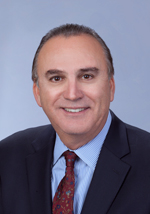 Michael Pichichero, MD
Michael Pichichero, MD
Vice President, Rochester General Hospital Research Institute
Director, Center for Infectious Diseases and Immunology
Phone: (585) 922-5959
Email: Michael.Pichichero@RochesterRegional.org
Dr. Michael E. Pichichero is a physician-scientist, trained and board-certified in pediatrics, pediatric infectious diseases, and adult and pediatric allergy/immunology. His career has been as a clinical and translational vaccine immunobiologist. He brings the experience of a continuously funded investigator by NIH since 1981. He has received over $70 million in federal, foundation, association and industry grants and he has >300 peer-reviewed publications; 150 in the field of vaccines and vaccine immunobiology pertaining to pertussis, diphtheria, tetanus, rotavirus, influenza, tularemia, botulism, and H. influenzae type b, pneumococcal and meningococcal conjugate and candidate nontypeable H. influenzae and S. pneumoniae protein candidate vaccines, and 65 in the field of acute otitis media (AOM). Dr. Pichichero was on the discovery team at the University of Rochester that invented the H. influenzae type b and pneumococcal conjugate vaccines. His role was candidate antigen identification, evaluation of mucosal and serum antibody responses and clinical trial supervision for prototype conjugate vaccines. In 2005, Dr. Pichichero returned to the bench, recruited 3 PhD scientists and a post-doc to launch a focused research team dedicated to vaccine immunobiology in children. He left the Univ. of Rochester in 2009 to accept a new position across town as Director of the Rochester General Hospital Research Institute (RGHRI).
Dr. Pichichero’s lab is focused on prospective, longitudinal clinical and translational studies of acute otitis media (AOM) (R01 DC 08671). His group seeks to define the adaptive and innate immune response deficits among otitis prone (OP) children to infections caused by nontypeable Haemophilus influenzae (NTHi) and Streptococcus pneumoniae (Spn). They seek to understand the immunity deficits among OP children in the context of overcoming the immune modulating effects of upper respiratory viral infections. To better understand NTHi and Spn pathogenesis and assist in vaccine development they are: (1) identifying specific adaptive immune deficits in OP children; (2) determining independent contributions of mucosal immunity in OP children; (3) understanding the role of innate responses to co-infection of respiratory bacteria and viruses; and (4) defining the role of differences in the nasopharyngeal (NP) inflammatory response in shaping the mucosal microenvironment to allow for NTHi/Spn colonization and then infection.
In 2011, Dr. Pichichero’s group discovered the most common immunodeficiency of children (occurring in about 5% of 6 to 24 month olds) they termed Prolonged Neonatal Immune Profile (PNIP). They found that PNIP children have even lower antibody and antigen-specific memory T-cell responses than normal young children to multiple vaccines. Their immune profile appears similar to neonates, leaving them even more susceptible to multiple vaccine-preventable infections. The differences in the immune responses of PNIP children and normal and other low vaccine responder young children may be attributable to multiple factors. The group plans to further characterize the immunologic differences of adaptive immune responses, interactions among immunity effector cells, and mechanisms that contribute to the more limited immune responses to vaccines in normal, low vaccine responders and PNIP young children. Their focus will be on CD4 T-cell, B cell and APC cell responses with respect to activation, function and long-term persistence (memory) after routine pediatric vaccinations, comparing normal, low vaccine responders and PNIP children. The ultimate goal is to understand the key characteristics of immunity in young children that might be augmented by new rational vaccine design and the addition of adjuvants to overcome the lack of response and need for multiple vaccine doses to establish protection from disease and lifelong immunity.
View Dr. Michael Pichichero's recent publications

Andrew “Andy” Cox, MD, PhD, FAAP
Associate Director, Center for Infectious Diseases and Immunology
Phone: (585) 922-3777
Email: Andrew.Cox@RochesterRegional.org
Dr. Cox is a pediatric physician-scientist trained and board certified in pediatrics and pediatric infectious diseases. Dr. Cox is a past recipient of the prestigious Pediatric Scientist Development Program K12 fellowship and a member of the second Mentored Career Development Cohort within the Infectious Diseases Clinical Research Consortium. His current research interests are cellular predictors of low vaccine response in infants, specifically the role of natural killer cells in shaping vaccine responses as well as interventions to improve vaccine responses.

Ravinder Kaur, PhD
Research Scientist III
Phone: (585) 922-2474
Email: Ravinder.Kaur@RochesterRegional.org
Dr. Kaur is a Research Scientist III trained in the fields of microbiology & immunology. Her research focuses on pathogenesis and immunology involving the bacterial pathogens S. pneumoniae and Haemophilus influenzae. Dr. Kaur works with human samples to understand differential expression of virulence determinants by these respiratory pathogens when they colonize the nasopharynx and progress to acute otitis media in children. She seeks to identify whether vaccine candidate proteins of S. pneumoniae and Haemophilus influenzae would be targets for immune responses occurring at the site of colonization compared to the site of infection. The microbiome of the nasopharynx and innate and adaptive immune responses may modulate protein expression by these respiratory bacteria; differences may exist between humans prone to such infections compared to those who resist infection more effectively.
View Dr. Ravinder Kaur's recent publications

Terri C Thayer, PhD
Research Scientist I
Dr. Terri Thayer received a Bachelor’s degree in Biology from Alfred University and a Ph.D in Immunology from the University of Pittsburgh. Dr. Thayer relocated to Cardiff, Wales, UK for her postdoctoral work. With the support of a Postdoctoral Fellowship from the Juvenile Diabetes Research Foundation, she investigated mechanisms of regulating the immune response to protect the pancreas from autoimmune attack and prevent type 1 diabetes. Her research interests include classifying immune responses associated with infection, vaccine antigen processing and archiving, and the role of T cells in establishing protection against infections
View Terri Thayer's recent publications
 Naoko Fuji
Naoko Fuji
Research Scientist I
Naoko Fuji was trained in the fields of virology and molecular epidemiology. She worked on respiratory viruses in pediatric severe respiratory illness. Her research interests are the interaction between bacterial and viral pathogens in hosts and their influence on the immune system. She is also interested in bacterial virulence changes in a manner that is specific to the infection site.
View Naoko Fuji's recent publications
 Andrew Bischer
Andrew Bischer
Post-Doctoral Fellow
Andrew Bischer completed his Ph.D. work in the lab of Dr. Robert Quivey at the University of Rochester Medical Center, studying the regulation of the rhamnose glucose polysaccharide structure of Streptococcus mutans and the role it plays in protection against acidic and oxidative stress. After completing his Ph.D., he worked in the lab of Dr. Andrew Wojtovich examining how bacterial toxins and oxygen levels alter behavior in the nematode C. elegans. He is interested in changes to host bacterial composition in response to vaccine pressure.
 Frank Salamone, MD
Frank Salamone, MD
Dr. Salamone is an otolaryngologist who has practiced in the Rochester community for over 20 years with an ongoing interest in clinical and basic science research involving otolaryngology diseases. He is particularly interested in the Institute’s research on otitis media and vaccine response in children. He is trained in data science and brings that expertise to RGHRI.
 Lea Vacca Michel, PhD
Lea Vacca Michel, PhD
Phone: 585-475-4273
Email: Lvmsch@rit.edu
Lea Vacca Michel, Ph.D. is a Professor in the School of Chemistry and Materials Science at the Rochester Institute of Technology. She is also the Director of Diversity, Equity, and Inclusion for RIT’s College of Science. Dr. Michel has collaborated on numerous projects with the Pichichero Research Team since the start of her faculty position in 2009, and she worked full-time in the Pichichero lab during her 8-month sabbatical in 2017. The Michel Research Team works on multiple protein biochemistry projects, broadly focused on the role of proteins in disease. Her collaborative work with scientists at the Center for Infectious Diseases and Immunology integrates her expertise in protein structure and bacterial extracellular vesicles with the Pichichero team’s expertise in immunology and vaccine development. Dr. Michel is deeply committed to mentoring her undergraduate and graduate research students and to increasing the participation of women and underrepresented minorities (including those who are deaf and hard-of-hearing) in science and math.
